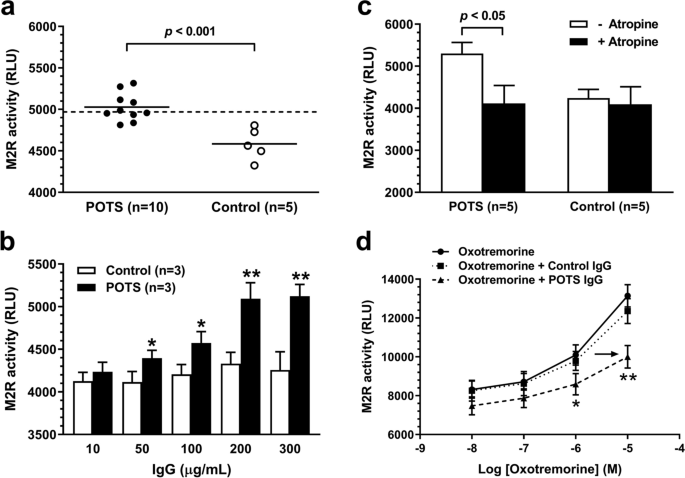Ryan31337
Senior Member (Voting Rights)
Abstract
Functional autoantibodies directed to the M2 muscarinic acetylcholine receptor (M2R) could affect the heart rate directly by altering cardiac M2R activity and/or indirectly by changing vagal-mediated cardiac M2R activity. We measured M2R autoantibody activity in sera from 10 subjects with postural tachycardia syndrome (POTS) and 5 healthy control subjects using a cell-based bioassay. Half of the POTS subjects demonstrated presence of elevated M2R autoantibody activity, while no significant M2R autoantibody activity was found in the healthy subjects. Serum-derived immunoglobulin G (IgG) from antibody-positive POTS patients induced a dose-dependent activation of M2R, which was blocked by the muscarinic antagonist atropine. Moreover, antibody-positive POTS IgG decreased the responsiveness to oxotremorine, an orthosteric muscarinic agonist, indicating an indirect inhibitory effect. These data suggest that M2R autoantibodies may contribute to the pathophysiology of POTS by increasing the normal vagal withdrawal during upright posture through its negative allosteric modulation of M2R activity.
Graphical abstract
M2 muscarinic receptor-activating autoantibodies are present in a subgroup of patients with POTS and act as a negative allosteric modulator of the orthosteric ligand response

Paywall, https://link.springer.com/article/10.1007/s12265-021-10167-z
Functional autoantibodies directed to the M2 muscarinic acetylcholine receptor (M2R) could affect the heart rate directly by altering cardiac M2R activity and/or indirectly by changing vagal-mediated cardiac M2R activity. We measured M2R autoantibody activity in sera from 10 subjects with postural tachycardia syndrome (POTS) and 5 healthy control subjects using a cell-based bioassay. Half of the POTS subjects demonstrated presence of elevated M2R autoantibody activity, while no significant M2R autoantibody activity was found in the healthy subjects. Serum-derived immunoglobulin G (IgG) from antibody-positive POTS patients induced a dose-dependent activation of M2R, which was blocked by the muscarinic antagonist atropine. Moreover, antibody-positive POTS IgG decreased the responsiveness to oxotremorine, an orthosteric muscarinic agonist, indicating an indirect inhibitory effect. These data suggest that M2R autoantibodies may contribute to the pathophysiology of POTS by increasing the normal vagal withdrawal during upright posture through its negative allosteric modulation of M2R activity.
Graphical abstract
M2 muscarinic receptor-activating autoantibodies are present in a subgroup of patients with POTS and act as a negative allosteric modulator of the orthosteric ligand response

Paywall, https://link.springer.com/article/10.1007/s12265-021-10167-z
